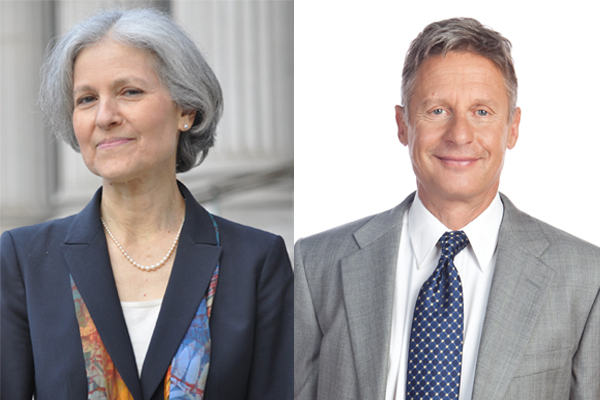Jill Stein and Gary Johnson Find Common Ground on Key Issues


On Thursday, IVN.us hosted the first ever online presidential debate over Google Hangout. Third party candidates, Jill Stein and Gary Johnson, graciously agreed to participate in an informative back-and-forth on important issues that are often neglected by the mainstream candidates.
Dr. Jill Stein is the presidential nominee for the Green Party and Gary Johnson is a former governor of New Mexico and is on the presidential ballot in most states for the Libertarian Party. Even though both are in a position where they have a chance, though slim, at winning the presidency, neither were invited to participate in the presidential debates hosted by the Commission on Presidential Debates.
These third party candidates come from two different schools of political philosophy. Mr. Johnson is a staunch Libertarian, some might argue more than Dr. Ron Paul (R-TX), who believes we need less government to solve the nation’s problems and has focused heavily on dramatic cuts to spending and balancing the budget as the biggest priorities.
“If we don’t balance the budget now we will have a monetary collapse,” Johnson said. He believes we cannot wait five to ten years for a balanced budget. Johnson also believes that in order to create a level playing field for all Americans in order to spur real economic growth we need to abolish the Internal Revenue Service and replace with the Fair Tax.
Dr. Jill Stein can be best described as a progressive-liberal who believes that more government initiatives are the solution to the biggest problems facing the United States today. High on her list of priorities is creating a path for public education, K-college, to be free to every student. Under her plan, the federal government would forgive all existing student loan debt and provide tuition-free education to solve the student debt crisis.
During the debate, Stein said the government should not be in the business of bailing out banks. She expressed her disagreement with the Federal Reserve going forward with another round of Quantitative Easing (QE3). She called it another bailout for the banks and said that, instead of bailing out banks, the government should be bailing out students.
Both presidential candidates disagree on issues mostly dealing with fiscal matters, but despite being on polar opposites of the political spectrum, they still manage to find common ground on some issues and commend each other for their positions on these matters. Dr. Stein said in her opening remarks:
“I think there are so many really critical ways in which we are completely in agreement and on the same page. On the war, on the importance of civil liberties and protecting the freedoms on which this country was founded. The importance of ending the drug wars, stopping the Wall Street bailouts. I think these are really fundamental points of agreement that I know for many people overshadow our areas of disagreement.”
The issues that Dr. Stein mentioned as areas of agreement between herself and Mr. Johnson are matters that both candidates have, ultimately, been able to find common ground on. Their positions on the issues might differ to some degree, but fundamentally they come to the same conclusions. Especially, on matters of civil liberties and individual freedoms.
She is right too. There are many independent voters who would find this appealing in a candidate for president or any elected office. So many people in the United States are fed up with partisan gridlock in Washington, or politics as usual, which is why there are so many people abandoning party affiliation and choosing to identify themselves as independents. People want to see our elected officials meet each other halfway and put the country above political squabbles.
Gary Johnson and Jill Stein may appear to be polar opposites. One believes in an individualistic philosophy; that people, and not governments are the true innovators. The other, a belief that government can and should promote quality social change; and by doing so, our individual lives will be better for it. One believes the federal government does not have a role in public education. The other believes the federal government should have more of a role. One believes in free market solutions to solve many problems the country faces, including matters of energy and climate control. The other believes in government solutions.
However, both recognize the need for change and reform on several issues and can come to an agreement on the desired end results. They believe it is important that we open political discourse so that all voices have a chance to be heard and we can find the best solutions for the biggest concerns Americans have. This is the type of leadership people want from the politicians who represent them in our nation’s capital.



